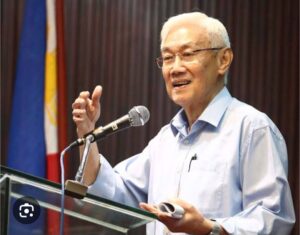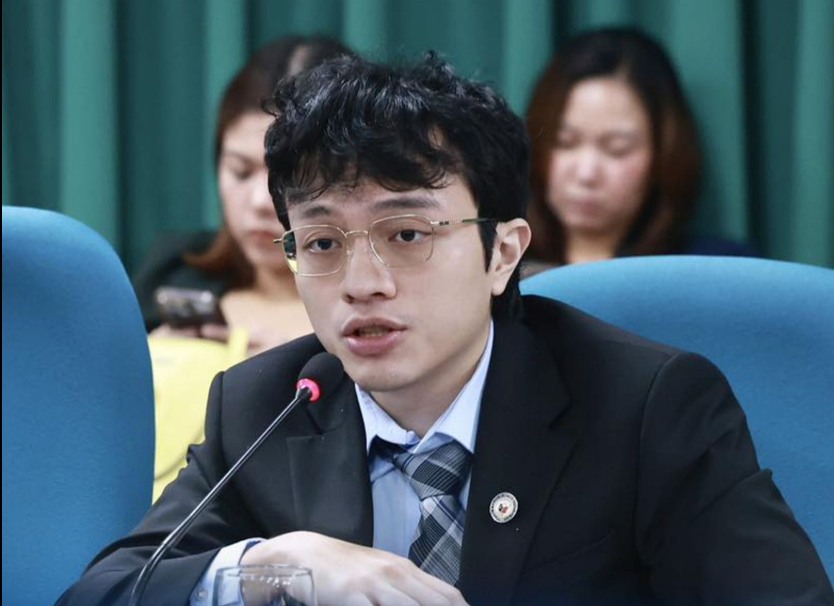By DIEGO MORRA
Thousands attended the June 16, 2025 four-hour tribute to Luis “Ka Louie” Jalandoni at the GT-Toyota Auditorium at the University of the Philippines in Diliman (UP-Diliman), with people crammed inside as speakers took turns acknowledging the herculean job of the former National Democratic Front of the Philippines (NDFP) leader who spent decades coaxing the government of the Republic of the Philippines (GRP) to seriously negotiate for a comprehensive peace with the NDFP and all the organizations belonging to the revolutionary coalition.
The militarist factions of the GRP had been responsible for sabotaging peace negotiations since 1987, when the Mendiola Massacre sent a clear message that these factions and their principals overseas were not willing to discuss the very basic issues that fuel the armed struggle. The murder of Ka Lando Olalia and Leonor Alay-ay later, along with the kidnapping of an executive of Mitsui Co. of Japan, were all calculated moves to derail the negotiations between the NDFP, represented by Satur Ocampo and Tony Zumel, and the GRP panel of Ramon Mitra Jr. and Teofisto Guingona.
For his assiduous pursuit of peace as chairman of the NDFP panel, Jalandoni worked to without let-up in crafting the negotiating points of the revolutionary coalition, painstakingly seeking to find common ground among the various groups under the NDFP. He was ever the diplomat who spoke with a soft voice but maintained commitment to analyze the issues raised, from indigenous peoples’ rights, equality of men and women, and respect for people of different sexual orientations. As international NDFP representative, Jalandoni touched base with various nations and political organizations, from Europe to Asia, Africa and Latin America, thus expanding global liaison and winning unqualified support for the people’s struggle in the Philippines.
Jalandoni and wife Coni Ledesma, once a detainee at the misnamed Ipil Reception Center (IRC) in Ft. Bonifacio during the dark days of martial law, are among the most illustrious representatives of the religious sector in the NDFP as they gave substance to the theology of liberation by working concretely to organize resistance to the despised Marcos martial law. Ledesma also fought for against camp restrictions as military jailers tried to limit visitation rights and intensified surveillance even inside the detention quarters. IRC became famous as the highest scorer for prison escapes. One prisoner at the Maximum Security Unit (MSU) at Ft. Bonifacio, the late Tony Cabardo, escaped four times, once from a military hospital, after feigning sickness. Tired of seeing him escape again and again, the Marcos dictatorship allowed his release to complete his course in engineering.
Unlike Cabardo. the escape artist, the Jalandonis were concerned on a daunting task, “engineering” a framework agreement that would serve as a guide for the continuing peace process. As recounted by the Philippine Ecumenical Peace Platform (PEPP), Louie led the NDFP peace panel in negotiating with the GRP in crafting the “Grundrisse” for what had been expected as a prolonged, tedious and contentious process. Jalandoni hoped for a principled dialogue that addresses the root causes of the armed conflict and is not stymied by discussions hewing to the 1987 Constitution. The two panels cut an agreement and signed the The Hague Joint Declaration of 1992 that laid the framework and substantive agenda of the formal peace talks.
For Jalandoni, deadlocks in negotiations are not insurmountable, particularly if the discussion partners are there to find solutions, and not prolong the agony that grips millions of impoverished Filipinos. The landmark Comprehensive Agreement on Respect for Human Rights and International Humanitarian Law (CARHRIHL) was crafted and signed by both parties under Jalandoni’s watch. It was an agreement that binds both the NDFP and the GRP to respect human rights and international law that are covered by international covenants. Naturally, militarist factions resented the agreement that they feel was binding their hands. These factions, led by US-trained counterinsurgency zealots, have had a field day committing massacres, abducting and torturing citizens in the mistaken hope of exterminating armed struggle. But as Medgar Evers said, “you cannot kill an idea.”
When Rodrigo Duterte took power in 2016, the NDF entertained the idea that GRP could pursue the peace process with dispatch, particularly after Duterte described himself as a “socialist president.” The possibility of even a tactical alliance got dissipated within a year as Duterte took in two progressives as Cabinet members, only to throw them under the bus by telling the Commission on Appointments (CA) not to confirm them. His “socialist” pretensions were shattered when the urban poor he tried to bribe with “free housing” denounced his policies. Behind the people’s back, Duterte crafted Memorandum Circular No. 32 (MC 32) and Executive Order No. 70 (EO 70) and enacted the reinforced Anti-Terrorism Act (ATA.) MC 32 mobilized troops and police commandos to besiege rural communities in Negros Island, Samar-Leyte and in Bicol. EO 70 created the National Task Force to End Local Communist Armed Conflict (NTF-ELCAC.)
Then, the Marcos Jr. administration took power in 2022 and on November 23, 2023, the NDFP and the GRP reiterated their commitment to pursue unconditional negotiations despite the unremitting campaign of militarist factions to block the peace talks. While Marcos peace process adviser Carlito Galvez spoke seriously about pursuing negotiations, Marcos national security adviser Eduardo Ano, a protege of convicted Maj. Gen. Jovito Palparan, thought the NDFP was not united in pushing the peace talks. Ano’s chatter consisted of the same old rotten banana about some revolutionary forces opposed to the talks and such condition provides an opportunity for the state to crush the insurgency once and for all. With Galvez and Ano speaking at cross-purposes and Malacanang apparently convinced to just dribble the ball, how can the NDFP proceed with the peace process? Moreover, Marcos Jr. retained Ano as his national security adviser despite clamor from other quarters to just let him go to pasture. Thus, the biggest hindrance to peace is back.




